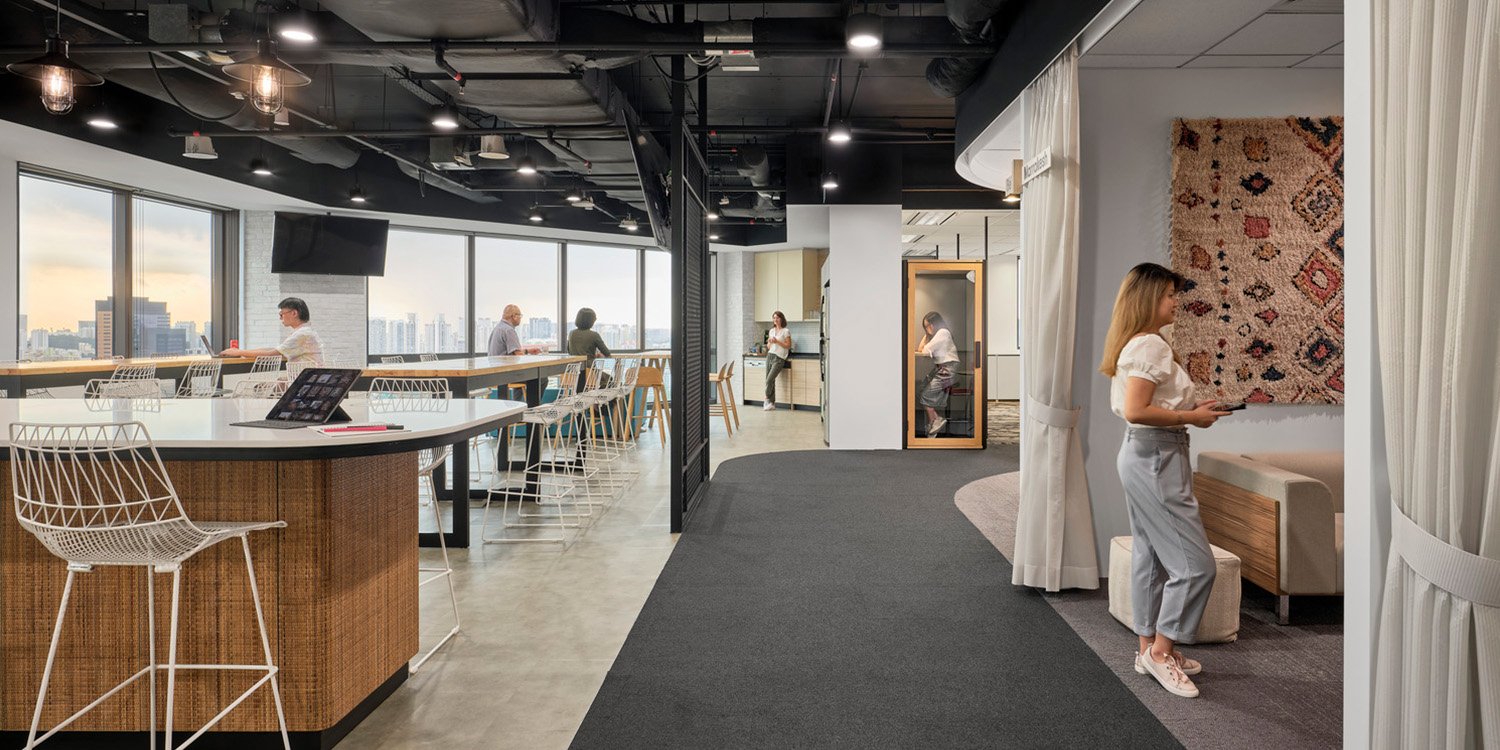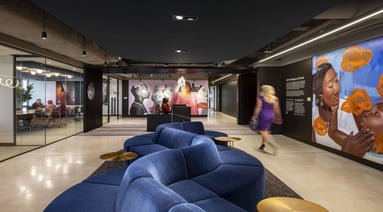Inclusive office design for neurodiversity

In a recent interview with WorkSpace Connect, our Chief Operations Officer Claire Shepherd and Chief People and Culture Officer Nicola Harris discussed the importance of office design in creating spaces inclusive to neurodiverse employees and that foster belonging.
Fostering a sense of belonging
A core part of Diversity, Equity, Inclusion, and Belonging (DEIB) is the sense of belonging. To truly ensure that everyone feels like they belong, we must consider both the workplace's culture and physical design.
“Belonging is: ‘It doesn’t matter who I am—I feel like I belong to this company’… from the workplace, the environments you’re sitting in, where you can have lunch, work-life balances, ability to outside and get fresh air. [DEI] programs must focus on basics so that any policies are inclusive, and you [the employee] aren’t reading it and feeling like it doesn’t apply or isn’t directed at you.” – Claire Shepherd, Chief Operating Officer, Unispace
To create neurodiverse inclusive spaces, organizations must first acknowledge neurodiversity in a positive manner. In many areas, people who are neurodivergent have higher abilities, and we must start focusing on all the strengths and assets that neurodiverse individuals can bring to a company. And with that, we must design our spaces to ensure that neurodiverse individuals feel like they belong in the workplace.
Inclusive design tips
- The choice of space.
Offering and reinforcing a menu of intentional spaces is one of the ways to support different workstyles. This involves a well-detailed layered office that says: this space is quiet; for noise, collaboration, or chatting. It's thinking about privacy vs. the open office. We must have a variety of spaces that people could go to depending on how they feel and how they best work. Consider wellness or mental health rooms that have comfortable pieces of furniture, places to sit, and calming music. - Lights and the ability to maintain them.
Flickering or overly bright lights might be intense for people no matter how their brain functions. Consider natural light in the space – natural light bulbs and windows with natural light coming in. Human beings aren’t made to live in boxes with no windows. Spaces with windows are important for mental health and wellbeing, but sometimes you also want darkness – so having those private rooms and recharging spaces with dimmer switches is essential. - Airflow in offices.
Purifying airflow and planting ventilation systems are essential in the workspace. Producing smells in an office can negatively or positively impact people. Consider power plants, rubber plants, and English Ivy, which are excellent at purifying the air and making people feel better.
We must create dynamic work environments that give all employees a chance to thrive. This involves accommodating many different workstyles and intentionally selecting environments, furniture, and a choice of interior design.
“Listening to clients, learning how they operate, collaborate, and what activity levels occur within their environment allows you to develop enough places to fulfill various needs. It all comes back to the point of choice—allowing people to choose where to work and how to operate. It boils down to the individual—how it works best for them at any given time.” – Nicola Harris, Chief People and Culture Officer, Unispace
Learn more about our DEIB work here.
Read the full WorkSpace Connect article, "Design Your Workplace to Support All Staff Equally," here.
Listen to Claire's insights about creating equity in the workplace through office space design.
About Claire Shepherd, Chief Operating Officer
 Claire has had years of experience in the real estate and wider industries, managing corporate portfolios, providing advisory and directing global operational delivery in complex environments. She has pioneered several organizational transformations: creating new functions, restructuring businesses, and merging existing organizations. With this wealth of experience, at Unispace, Claire focuses on developing infrastructure to connect our global operations and optimizing our delivery of client operations. This includes enhancing our systems and procurement strategy and integrating new companies within our organization.
Claire has had years of experience in the real estate and wider industries, managing corporate portfolios, providing advisory and directing global operational delivery in complex environments. She has pioneered several organizational transformations: creating new functions, restructuring businesses, and merging existing organizations. With this wealth of experience, at Unispace, Claire focuses on developing infrastructure to connect our global operations and optimizing our delivery of client operations. This includes enhancing our systems and procurement strategy and integrating new companies within our organization.
About Nicola Harris, Chief People and Culture Officer
 Based in our London studio, Nicola is the Chief People & Culture Officer for Unispace. With 22 years of HR experience in professional services and real estate, Nicola and her team support the business to succeed through the contribution of our people. At Unispace every role matters and each individual has the opportunity to reach their greatest potential. Nicola wants every Unispace employee to be passionate about what we do and engages leaders and managers to align daily activity to our ultimate business goals. And, we have to have fun too, so celebrating our successes together as one team is always high on the agenda.
Based in our London studio, Nicola is the Chief People & Culture Officer for Unispace. With 22 years of HR experience in professional services and real estate, Nicola and her team support the business to succeed through the contribution of our people. At Unispace every role matters and each individual has the opportunity to reach their greatest potential. Nicola wants every Unispace employee to be passionate about what we do and engages leaders and managers to align daily activity to our ultimate business goals. And, we have to have fun too, so celebrating our successes together as one team is always high on the agenda.


-1.png?width=383&height=348&name=CoreNet_CRE_LinkedIn-(003)-1.png)